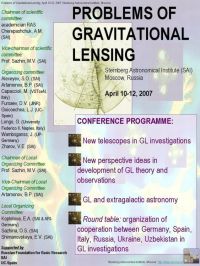| Maidanak Lab: Boris Artamonov (head), Yurij Badan, Irina Bilenko, Vasily Bruevich, Alexandr Gusev, Olga Ezhkova, Ekaterina Koptelova, Valery Kravtsov, Alexandr Kudinov, Sergey Novozhilov, Sergey Ponomarenko, Elena Shimanovskaya, Lyubov Ugol'kova |
 |
Workshop on
gravitational lensing
at Sternberg Astronomical Institute April 10-12, 2007
|
Pictures from Shatzhatmaz plateau

Maidanak Observatory and Instruments
In 1972, Sternberg Astronomical Institute of Moscow State University
(SAI MSU) initiated a search of sites with the best astroclimate in
Central Asia. Mountain Maidanak (150 km to south from Samarkand, Uzbekistan)
was chosen after the continuous investigation of meteorological conditions,
temperature fluctuations and seeing quality in different testing sites.
At the end of 1972, SAI MSU have finished mainly the construction of
Maidanak Observatory. The main instrument of Maidanak Observatory is
1.5 meter RC telescope (AZT-22) manufactured by optical firm LOMO (Russia,
S-Peterburg). Optical shop test confirmed the high quality of the optical
system AZT-22 limited diffraction optics. The 1.5-meter telescope was
installed in the dome equipped with ventilator system for the smoothing
of the inside dome turbulence. The isolated summit Mt.Maidanak (2600
meter) have good astroclimatical parameters: 2000 clean observational
hours per year and mean seeing (FWHW) is about 0.7 arcsec (Artamonov
et al. 1987, Ehgamberdiev et al. 2000). After the USSR disintegration
Maidanak Observatory property was assigned to Ulugh-Beck Astronomical
Institute (Tashkent, Uzbekistan).
The excellent 1.5 meter telescope, good seeing and a large number of
clear nights make possible the long-term monitoring of gravitational
lenses system (GLS). The collaboration were carried out by three groups
from Ulugh Beg Astronomical Institute (Tashkent, Uzbekistan), Astronomical
Observatory of National Kharkov University (Ukraine) and Sternberg Astronomical
Institute of Moscow State University (Russia) for making of monitoring
selected GLS.
Because of technical reasons, we had to use three different CCD cameras
in our observations, Pictor-416 camera in 1995, Pictor-416 and TI 800
x 800 cameras in 1997 and 1998, and ST-7 camera in 1999 and 2000. And
because of technical reasons again, both f/8 and f/16 focal lengths
were used in observations. The LN-cooled TI 800 x 800 camera, with pixel
size of 15/u, kindly provided by Prof.D.Turnshek, unfortunately revealed
some peculiarities, caused by the charge transfer inefficiency, that
is characteristic for the CCD's of this generation. In particular, noticeable
stretching of stellar images in the direction of charge transfer is
observed, as well as a dependence of the PSF upon coordinates at the
chip plane. In addition, sensitivity irregularities of the chip can
not be corrected satisfactorily, with the output of the flat-fielding
procedure dependent on the signal level. All these peculiarities reduced
the actual accuracy of photometry. Since October 2000 CCD LN-cooled
SIT 2000*800 camera was installed on 1.5 meter telescope. The manufacturing
of this CCD camera was supported by Maidanak Foundation created by Henric.E.Nilson
(Bergen, Norway). Last observations of GLS in 2000-2003 were made with
new CCD SIT camera.
Collaboration
Lab works in collaboration with Ill-posed Inverse Problems Group of Physics Faculty of Moscow University (Russia), Kharkiv National University(Ukraine), Institute of Radio Astronomy(Ukraine), Ulug-Bek Astronomical Institute(Uzbekistan).

